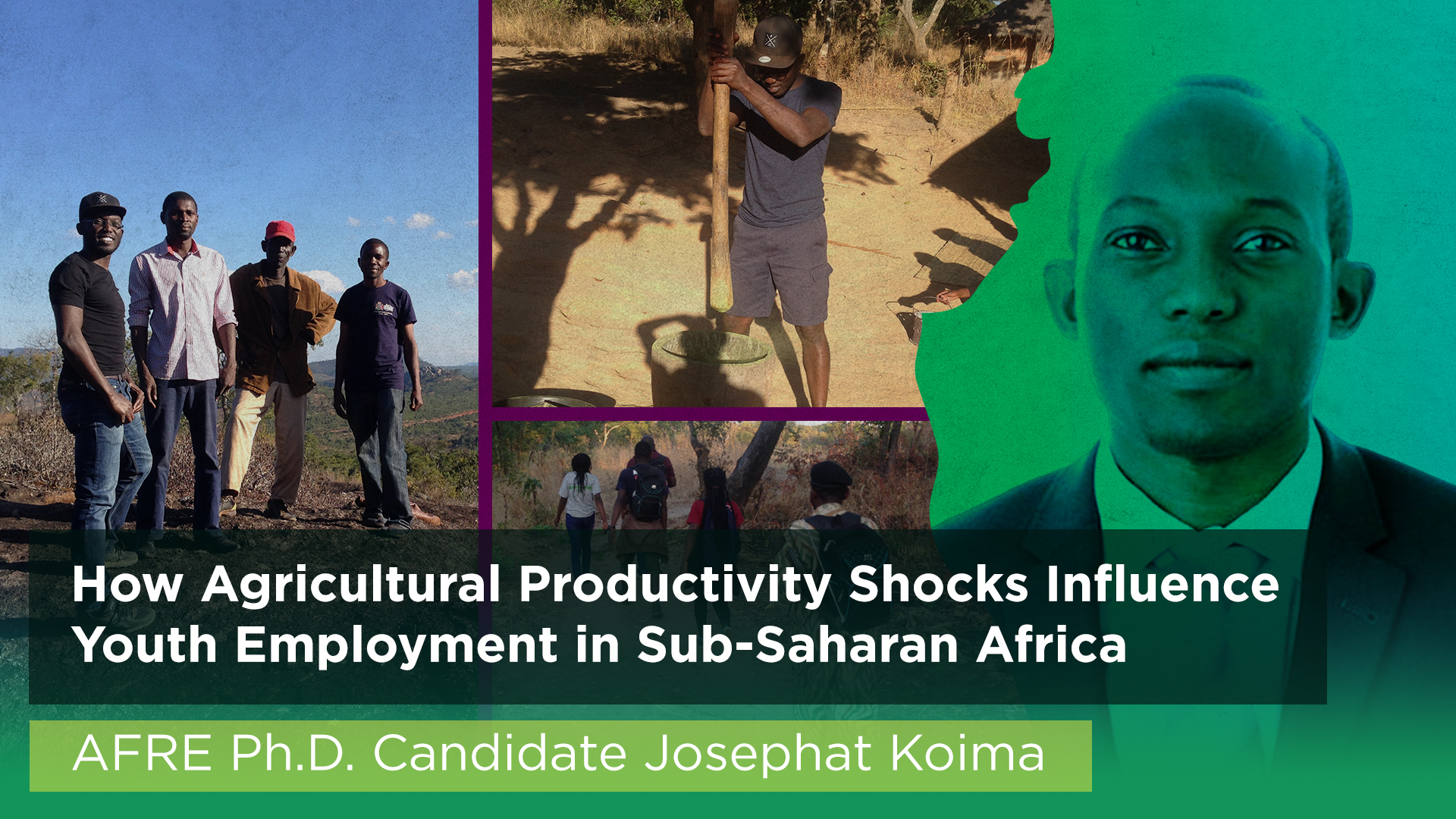How Agricultural Productivity Shocks Influence Youth Employment in Sub-Saharan Africa
MSUAFRE Ph.D. student, Josephat Koima’s, research focuses on the intersection of agriculture, youth employment, and human capital development, and is influenced by the need to address the rising youth population in Sub-Saharan Africa.

Fifth-year Ph.D. dual major student, Josephat Koima, in the Department of Agricultural, Food, and Resource Economics (AFRE) and the Department of Economics, grew up in a rural agricultural household in Kenya. In Koima’s community, farming was not a lucrative source of income, but by far the major, and sometimes the only, source of employment. Despite his humble upbringing, Koima was able to attend one of the best schools in Kenya, where he graduated among the top of his class. Koima’s success in school earned him admission into the Kenya Scholar Athlete Project (KENSAP), which facilitated his application to Williams College in the United States. At Williams, Koima developed a passion for mathematics and economics. Koima soon realized he could apply these passions to solve complex world problems, including problems faced by people in his home community in Kenya, in particular, high rates of youth underemployment in Sub-Saharan Africa.
After graduating from Williams College, Koima joined the International Monetary Fund (IMF), where he worked in a team dedicated to helping countries build institutional capacity in fiscal and monetary issues. Afterwards, Koima pursued a master’s degree in economics at the University of Maryland, before joining AFRE for his Ph.D. studies. Koima chose AFRE because he wanted to study development economics with a focus on agriculture. Koima was drawn to the department’s expertise in Sub-Saharan Africa and the generous funding opportunities for student research.
Since joining AFRE, Koima has been working with Dr. Milu Muyanga, AFRE faculty member in development economics, who serves as Koima’s major professor. Since recommending Koima for admission into the AFRE Ph.D. program, Muyanga says that Koima most certainly has not disappointed. Muyanga continues, “Once at MSU, Josephat was even more impressive in person than on paper. Humble and soft-spoken with a knife-sharp intellect, he immediately began making enormous contributions to my international development projects and making outstanding contribution in departmental seminars and other activities.”
Koima believes his research on youth underemployment is important because understanding how agricultural shocks influence the creation and expansion of non-farm sectors provides evidence necessary to craft policy to support agricultural growth, as well as growth in non-farm sectors. According to Koima, it is clear that agriculture will not be a sustainable form of employment as population continues to rise. As a result, human capital development is necessary to ensure that youth can find alternative employment activities in the future. Koima’s research on how agricultural shocks affect investment in education will inform policies aimed at ensuring that school-going children remain at school.
Some key takeaways of Koima’s research findings include some evidence that high agricultural productivity can boost employment in the non-farm sector, and some evidence that high productivity leads to an increase in spending devoted to educational expenses. According to Koima, “This suggests that efforts aimed at boosting agriculture are good because they can lead to increased employment and higher educational attainment.” In addition to applied research, Koima is interested in making contributions that advance theoretical models, too.
One of Koima’s favorite aspects of research is the data collection. Koima had an opportunity to participate in fieldwork and he found the entire process fascinating, from selection and training of field enumerators, to data quality control checks. In the future, Koima hopes to contribute to research on agricultural issues, such as land access, productivity, and employment. He also hopes to make significant contributions to human capital development among rural agricultural households. Finally, Koima would like to make sure that his research contributes to mitigating gender gaps in decision-making and economic progress.
Although COVID-19 has limited Koima’s research opportunities, he is eager to utilize and develop his research skills, adding, “I am keen on venturing into new research methods and tools, such as automation and machine learning. I would also like to use experiments to answer interesting questions in developments.”
When he is not working on his research, Koima enjoys running, and playing soccer and tennis.
Learn more about Josephat Koima and the AFRE Ph.D. program.



 Print
Print Email
Email




